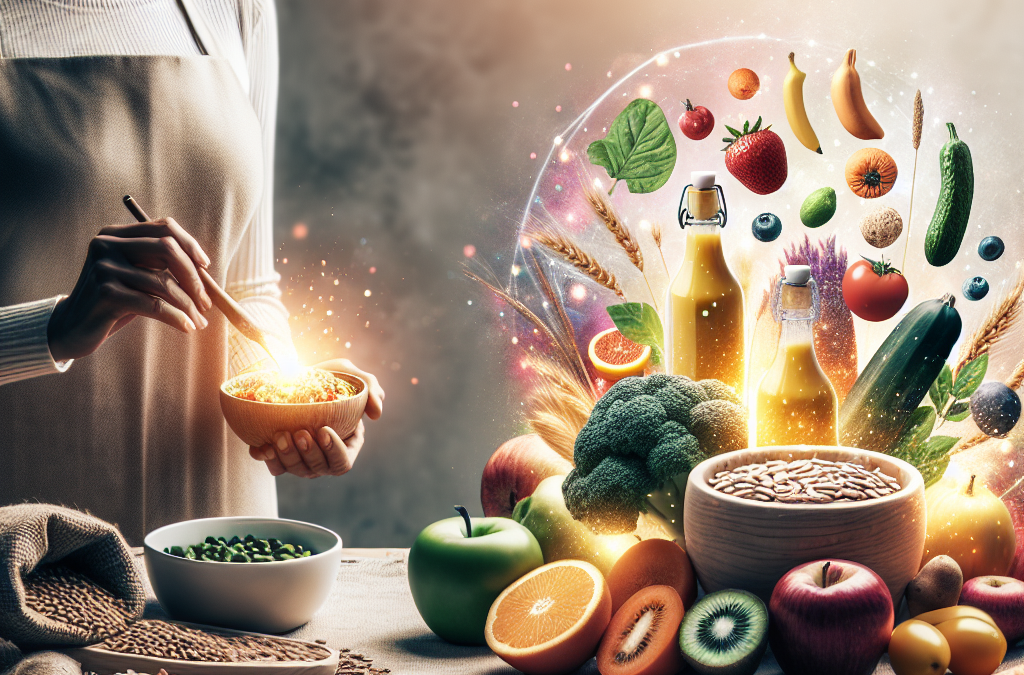1. The Power of Whole Foods
Understanding Whole Foods
When I first dove into the world of organic foods, I discovered the magic of whole foods. Whole foods are those that are minimally processed and free from artificial ingredients. Just think about it: an apple is an apple, right? But a processed snack bar? Not so simple. Whole foods contain vital nutrients that play a huge role in brain health, and they are packed with vitamins and minerals that help keep our minds sharp.
By focusing on whole foods, I’m feeding my body what it truly needs instead of excess sugar and additives. It’s like giving your brain premium fuel instead of cheap gas. I’ve noticed a significant boost in clarity and focus when I munch on these natural gems. Plus, the energy lasts longer, which is a game changer when you have a packed schedule!
Another thing I’ve realized is that whole foods often come with additional benefits—like fiber! Fiber helps with digestion and can keep that steady energy going, which is invaluable when you’re trying to concentrate on a task. So, always keep those whole foods stocked in your pantry!
2. Nutrient-Rich Superfoods
The Importance of Superfoods
Superfoods are these incredible little powerhouses of nutrients that can seriously enhance our brain function. Ever heard of blueberries or kale? Those are the champions of the superfood world! I’ve started incorporating these into my daily meals, which has been a total breakthrough for my focus.
Eating superfoods is like getting an upgrade for my brain! For instance, blueberries are packed with antioxidants, which help protect the brain from oxidative stress. I often throw them into my morning smoothie for a delicious brain boost. Trust me, your neurons will thank you!
It’s also fun to experiment with different superfoods—like adding chia seeds to my yogurt or munching on a handful of nuts during the afternoon slump. They not only keep me full but also provide a steady stream of energy throughout the day.
3. Balanced Meals for Steady Energy
The Recipe for Success
Creating balanced meals is essential to maintaining focus without crashing. I’ve learned that every meal should ideally include protein, healthy fats, and carbohydrates. It sounds simple, but this trio is key! For example, I love making a quinoa salad with chickpeas, olive oil, and lots of fresh veggies for a nutrient-dense meal.
When I combine protein with healthy fats, it helps stabilize my blood sugar levels. That means I’m not just burning out after a quick snack! Oh, and let’s not forget how delicious it is. Food should be enjoyable, and it’s amazing how a little creativity can transform even healthy meals into a feast!
Having no more than three hours between meals is my golden rule. This keeps my energy steady, and I can focus better on whatever task is at hand. It’s like a well-oiled machine running the way it should!
4. Hydration and Its Impact
The Science of Hydration
Staying hydrated is something I used to underestimate, but it’s so critical for keeping focus sharp. I’ve recently made it a habit to keep a water bottle by my side. Our brains are made up of around 75% water, and dehydration can lead to fatigue and decreased concentration.
Get an Amazing Discount on the Best Certified Organic Whole Food Supplement!
What I love doing is infusing my water with fruits like lemon or cucumber. It makes drinking water a lot more enticing, and I get a boost of vitamins at the same time! Plus, it’s a simple way to remind myself to keep sipping throughout the day.
Every time I notice my focus slipping, I check my water intake. It’s often the first culprit! Keeping hydration at the forefront of my routine has been a game-changer for concentration.
5. Mindfulness with Eating
The Art of Mindful Eating
Mindfulness has been absolutely transformative for my relationship with food and focus. Instead of mindlessly munching while scrolling on my phone, I’ve started practicing mindful eating. This means I pay attention to each bite, savoring the flavors and textures of my meal.
Taking the time to enjoy my food not only enhances my eating experience but also improves my focus. I find that when I eat mindfully, I become more attuned to my body’s hunger cues, allowing me to nourish myself better.
Moreover, I’ve noticed that it’s easier to concentrate on my work after a meal when I take the time to slow down. It’s as if I’m resetting my mind, preparing for the next burst of productivity. I really encourage you to try it—you might be surprised at how much it changes your focus!
FAQs
1. What are some examples of whole foods?
Whole foods include fruits, vegetables, whole grains, nuts, seeds, and legumes. These foods are generally unprocessed and contain no added sugars or artificial ingredients.
2. How do superfoods improve focus?
Superfoods are rich in nutrients that support brain health and function. For example, foods high in antioxidants, healthy fats, and vitamins can help enhance cognitive function and protection against mental fatigue.
3. What should I include for a balanced meal?
A balanced meal should include a good source of protein (like chicken or beans), healthy fats (such as avocado or olive oil), and complex carbohydrates (like quinoa or whole grain bread). This combination provides sustained energy and helps maintain focus.
4. How much water should I drink for optimal focus?
While it varies per individual, a common guideline is to aim for at least 8 cups (64 ounces) of water a day. Adjust based on your activity level and climate; always listen to your body’s thirst signals.
5. What is mindful eating and how can it help me?
Mindful eating involves paying close attention to the experience of eating and drinking, both inside and outside the body. Practicing this can lead to a more satisfying meal experience and improved focus, as you become more aware of your body’s hunger and fullness cues.




